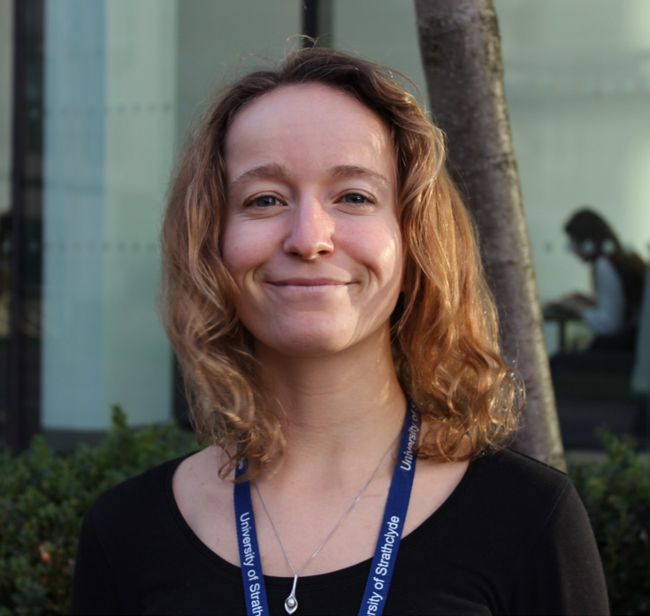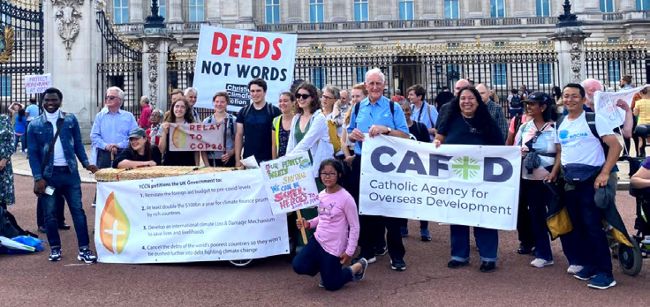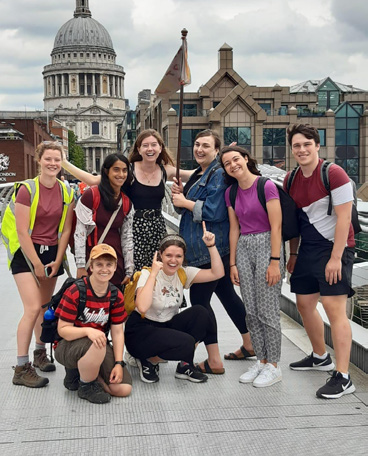‘The most important thing we can all do is talk’
Jackie Macadam learns about the work and faith of Jen Morris, one of the co-ordinators involved with the Climate Pilgrimage ahead of this month’s COP26 conference in Glasgow.
“THERE can’t be many things that were set up in the summer of 2020, at the height of the first Covid-19 crisis, but the Young Christian Climate Network was.”
Jen Morris, born in Hull but now living in Glasgow, is helping co-ordinate one of the major events which lead up to the COP26 conference this month – the Climate Pilgrimage.
“COP26 is going to be one of the defining moments in the decision-making process that could make or break the success of the fight against the climate crisis, and so YCCN knew that this was a key global event to bring our voices to.
“One of the oldest Christian traditions is that of pilgrimage, which we know can be an incredibly powerful experience, and so it seemed an appropriate way to ground our message,“ she says.
“We had also seen the success and power of previous climate justice pilgrimages such as Pilgrimage 2 Paris in 2015. However, we wanted to be able to engage the maximum number of communities across the UK and also to be as accessible as possible, which is tricky with a long pilgrimage. By splitting the journey up into a relay of short sections, we are connecting into this ancient Christian tradition, but updating it and allowing for much wider involvement from people who wouldn’t be able to join in for the whole route. The only pilgrim who will be completing the whole journey is our boat (aptly named The Pilgrim!) which represents the fact that, although we are all in the same storm, we are not in the same boat when it comes to the climate crisis.”
Jen’s introduction to the climate crisis came early – and in a major way.
“It wasn’t until my later teenage years that I became more aware of the systematic issues of the climate crisis as separate from a general responsibility for the local environment. My family has always been quite outdoorsy and my brother and I were dragged on numerous walks and adventures around Yorkshire and North Wales when we were young.
We were taught a respect for nature, and that we had a responsibility to care for our surroundings.
“In 2007, Hull and the surrounding region was hit by very severe floods. My family was very lucky and suffered limited damage, but many neighbours lost livelihoods, homes and huge amounts of money. What strikes me most as I reflect on that event now is how quickly public attitudes have shifted to normalise these disastrous weather events – at the time, we saw this a bizarre, freak event, but in the years since it has become almost normal to see people in some part of the UK wading down submerged high streets or being airlifted from their roofs. This normalisation is dangerous.
“We have to resist becoming immune to the shocking scenes of climate-related loss and suffering that get beamed into our newsfeeds from all over the world.
Every year now we are breaking global records of temperature, drought, flooding and wildfires, and this is just the beginning, but we can act to stop these worsening events becoming normal.”
Though Jen’s upbringing wasn’t particularly religious, she found her faith when she went to Cambridge University.
“At first it was a calm, peaceful escape from the stress of exams and the constant clamour of university life, “ she said.
“However, I was quickly struck by the fact that the people around me were clearly exceptionally intelligent, and therefore that this sincere belief they held in Jesus as the Son of God was at least worthy of being examined a bit more closely. I have always been logical and scientific and so, far from having a moment of sudden, emotional revelation, I came to faith first through an intellectual examination of the historical facts I could find. From that point I began to really get to know God, and by the time I graduated I was fully committed to a life following Christ.”

Jen Morris
Most importantly, along the way I have learnt that the climate crisis is not about ‘saving the polar bears’, but about real, immediate human suffering. The cost of our carbon emissions and environmental destruction is not an impersonal loss of pretty landscapes, but the direct loss of human lives and livelihoods across the world.
She realised that she needed to use her knowledge and skills to help tackle the climate crisis, and as an engineer, that was something she could do. She moved to Glasgow to complete a PhD.
“In my last two years at Cambridge, I really focused in on the field of renewable energy, and became convinced that I had a duty to use my skills to contribute to what was clearly going to be the biggest engineering and political challenge of my lifetime. I am now studying for a PhD at the University of Strathclyde, Glasgow, where I work on the challenges of connecting large offshore wind farms to the electricity grid in remote areas such as North Scotland,” she says.
“My Mum worked closely with the renewable energy industry as director of a sustainability thinktank which bridged industry and academia at the University of Hull. All of this introduced me to the idea of wind power and a move away from fossil fuels from an early age. Taking on a PhD in the renewable energy sector then led me much deeper into this field and opened my eyes to just how bad the climate crisis situation currently is. Most importantly, along the way I have learnt that the climate crisis is not about ‘saving the polar bears’, but about real, immediate human suffering. The cost of our carbon emissions and environmental destruction is not an impersonal loss of pretty landscapes, but the direct loss of human lives and livelihoods across the world.
Connecting the dots of the climate crisis and the real human pain and injustice has made me a lot more engaged in conversations about the climate crisis, both with friends and family and through direct activism. My faith has also been hugely important in this journey, as one of our primary callings as followers of Jesus is to uphold justice and help the vulnerable. This means loving our neighbours who are suffering droughts and floods and famines due to the changing climate as much as we love the neighbours right in front of us day to day.”
Jen sees COP26 as an ideal place to raise global attention to the problems and effects caused by climate change all over the world.
It’s not just a matter of Scotland being hit by previously unseen heatwaves and temperatures, but countries whose land is disappearing, or whose rainfall has disappeared.

Top: The YCCN relay at St Stephen’s Church Twickenham Bottom: The YCCN relay at Buckingham Palace

Top/bottom: The YCCN relay at St Paul’s Cathedral
“Living in Glasgow and working in renewable energy research means that COP26 has been on my radar for quite some time, especially given the year delay for the pandemic. When the YCCN relay was launched, it seemed like the perfect way to reconcile my faith and my passion for climate action. I am also volunteering in the Green Zone throughout COP26 and will be leading the engagement of my own church with climate action and COP26. I think that COP26 can be a huge opportunity for Glasgow, and particularly to engage people and groups that might not have previously been involved in discussions about the climate crisis.
“The climate crisis is both a symptom, and a cause of, global injustice. Historically, the richest nations of the global north have built their wealth on carbon-intensive industrialisation that has created the emissions disaster we now see. It is understandable that developing countries see the unfairness in not being allowed to have ‘their turn’ at industrialising in the same way.
However, these same nations also tend to be the most at risk from the effects of rising sea levels and extreme weather patterns that we are already seeing with alarming regularity.”
The Pilgrimage Relay has proved to be an incredibly popular idea, with pilgrimages coming to Glasgow from all over Britain, working their way up across the mainland from the very southern coast at St Ives to arrive in Glasgow for the summit.
“The relay has picked up incredible momentum over the last couple of months,” says Jen, “and we’ve been so encouraged and blessed to see how it has been taken to heart by every community it has passed through. By early September we had clocked up 1000+ walkers (plus countless other accommodation hosts, meet and greeters, bakers and support volunteers), 650 miles walked and involved 60 churches across eight denominations. Support for the relay is growing with every day that we walk, so we expect the second half to comfortably outperform the first in terms of engagement.
“Along the way, local churches have shown incredible hospitality in welcoming walkers for lunch, tea breaks, services, prayer events, accommodation, greetings and on-call support. We absolutely couldn’t have done any of the relay without the enthusiasm and love we’ve been shown by congregations and supporters along the way, from inviting pilgrims into their homes and churches, to providing breakfast and blessings.”
“The sails of our boat, The Pilgrim, are made by communities in Zambia, Grenada, Laos, Nepal, the Philippines, Vanuatu and Zimbabwe. People in these nations at the forefront of the climate crisis, suffering hugely from droughts, floods and extreme weather events that destroy farmland, homes and infrastructure and which are increasing in frequency and ferocity.
We have been highlighting these stories at pilgrim services throughout the relay and it is these voices that are the most important to be heard in the climate storm. We have also had really critical support from Christian Aid, who have been fantastic ever since the relay was first imagined, not to mention Ecocongregation, Tearfund, CAFOD, SCIAF and many more groups.”
To the young people of YCCN, COP26 is a crucial time in the battle against climate change.
Jen explained: “COP26 must be a turning point in the climate crisis. The decisions that are made here will affect generations to come and will either save or cost millions of lives. At YCCN, we believe we have to do all we can to advocate for, and amplify the voices of those at the forefront of this crisis, so that their stories shape the decisions that are taken.
In particular, this is a moment when developed nations have to show that they can be trusted when it comes to the promises made on climate finance and support. For decades the richest nations have been saying the right words and yet doing very little to alleviate the debt and climate risk of nations in the global south, while at the same time expecting them to step up to invest in climate mitigation and adaption.
COP26 must be a turning point in the climate crisis. The decisions that are made here will affect generations to come and will either save or cost millions of lives.
“COP26 is an opportunity to turn this around, to show that we are willing to provide the money and resources to take the climate crisis seriously and to lift up the most vulnerable communities out of the terrifying situation we have placed them in. YCCN believes, particularly as Christians, (we) must speak out on such fundamental injustice, particularly when world leaders are coming to the UK to make these choices. We must be able to say that we did not sit at home while unjust decisions were made on our doorstep.”
As the YCCN relay arrives in Glasgow, it will join with several other pilgrimages that began elsewhere in Europe, and there will be a joint march through the city and out to the conference venue.
“Throughout COP26 (October 31 to November 12), our boat can be visited in St George’s Tron Church in Glasgow and we hope to make this a collaborative space for people to contribute prayer and reflection,” she said.
“The most important thing we can all do is talk. Talk to your friends and family about the climate crisis and what it means to you. Write to your MP and tell them of your concerns and hopes for COP26.
“And change the language we use with respect to the climate crisis – for too long, the narrative of ‘saving the planet’ has distracted from the fact that it is human lives and livelihoods being destroyed and we have to frame our discussions in ways that highlight the true human impact of climate injustice.
“And of course, talk to God too – pray for our leaders, for climate campaigners, for our brothers and sisters at the forefront of this crisis. We need huge, global, systematic change to tackle the climate crisis, which seems overwhelming, but we can always bring these things to God in our prayers.”
You can contact the YCCN at www.yccn.uk